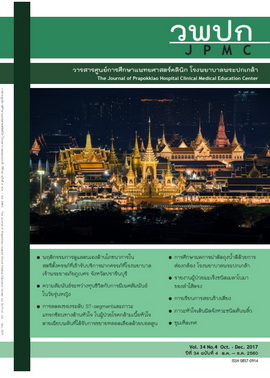พฤติกรรมการดูแลตนเองด้านโภชนาการในสตรีตั้งครรภ์ที่เข้ารับบริการฝากครรภ์ ที่โรงพยาบาลเจ้าพระยาอภัยภูเบศร จังหวัดปราจีนบุรี
Main Article Content
Abstract
พฤติกรรมการดูแลตนเองด้านโภชนาการในสตรีตั้งครรภ์ที่เข้ารับบริการฝากครรภ์ที่โรงพยาบาลเจ้าพระยาอภัยภูเบศร จังหวัดปราจีนบุรี
สมบูรณ์ บุณยเกียรติ, วทบ. กศม.*, ผกากรอง จันทร์แย้ม, พย.บ.**
*คณะพยาบาลศาสตร์ วิทยาลัยนานาชาติเซนต์เทเรซา,
**โรงพยาบาลเจ้าพระยาอภัยภูเบศร จังหวัดปราจีนบุรี
บทคัดย่อ
ที่มาของปัญหา: ภาวะโภชนาการเกินในสตรีตั้งครรภ์เป็นสาเหตุของโรคเบาหวาน และโรคความดันโลหิตสูงได้ ด้านทารกในครรภ์ทำให้ทารกมีน้ำหนักตัวมากซึ่งเสี่ยงต่อการคลอดยาก ติดไหล่ขณะคลอด เป็นอันตรายต่อระบบประสาทที่บริเวณแขนซึ่งเสี่ยงต่อความพิการได้ ภาวะโภชนาการน้อยส่งผลให้มารดามีภาวะซีด ทารกมีน้ำหนักน้อย คลอดก่อนกำหนดเสี่ยงต่อพัฒนาการต่ำกว่าเกณฑ์ได้
วัตถุประสงค์: เพื่อเปรียบเทียบพฤติกรรมการดูแลตนเองด้านโภชนาการในสตรีตั้งครรภ์ที่มีกลุ่มอายุครรภ์และดรรชนีมวลกายก่อนการตั้งครรภ์ที่ต่างกัน
วัสดุและวิธีการ: กลุ่มตัวอย่างเลือกแบบเจาะจงไม่จำกัดอายุครรภ์ ครั้งที่ ของการตั้งครรภ์และไม่มีโรคแทรกซ้อนในระหว่างการตั้งครรภ์จำนวน 120 ราย เครื่องมือเป็นแบบสอบถามประกอบด้วย ข้อมูลส่วนบุคคล ปัจจัยการตั้งครรภ์และพฤติกรรมการดูแลตนเองด้านโภชนาการจำนวน 20 ข้อที่ผู้วิจัยพัฒนาขึ้นมาเองมีค่าความเที่ยงสัมประสิทธิ์อัลฟาของครอนบาคเท่ากับ 0.651
ผลการศึกษา: พบว่าสตรีตั้งครรภ์มีพฤติกรรมการดูแลตนเองด้านโภชนาการระดับปานกลาง ( 2.30, S.D. =.24) และสตรีตั้งครรภ์ที่มีอายุครรภ์มากกว่า 28 สัปดาห์ มีพฤติกรรมการดูแลตนเองด้านโภชนาการดีกว่ากลุ่มที่มีอายุครรภ์ 14- 28 สัปดาห์อย่างมีนัยสำคัญทางสถิติ (p <.05) และสตรีตั้งครรภ์ที่มีดรรชนีมวลกายก่อนตั้งครรภ์ปกติมีพฤติกรรมการดูแลตนเองด้านโภชนาการ ขณะตั้งครรภ์ดีกว่ากลุ่มที่มีดรรชนีมวลกายก่อนตั้งครรภ์เกินอย่างมีนัยสำคัญทางสถิติ (p <0.01)
สรุป: การให้คำแนะนำควรคำนึงถึงอายุครรภ์และดรรชนีมวลกายก่อนตั้งครรภ์ที่ต่างกันเพราะเป็นปัจจัยที่เกี่ยวข้องกับพฤติกรรมการดูแลตนเองด้านโภชนาการขณะตั้งครรภ์ ซึ่งจะนำไปสู่การมีสุขภาพดีของสตรีตั้งครรภ์และทารก
Self-Care Behavior of Nutrition among Pregnant Women at Prenatal Care Clinic of Chaopaya Apaipubejhr Hospital. Prachinburi province.
Somboon Boonyakiat, B.Sc. (Nursing), M.Ed.*, Pakakrong Junyam, B.N.S.**
*Faculty of Nursing ,St Theresa International college.
**Chaopaya Apaipubejhr Hospital, Prachinburi Province
Abstract
Background: Over weight during pregnancy can cause, diabetes and hypertension. In addition, it can cause large baby which is related to a difficulty during delivery. Plexus injury is a common complication that could cause baby disability in the future. On the other hand malnutrition during pregnancy possibly causes anemia leading to small fetus for gestational age which is related to premature delivery. Premature baby is one of the common risk factors resulting in poor child development.
Objective: The purpose of this study was to compare self-care behavior of nutrition among pregnant women that were classified in different groups by using gestational age and body mass index before pregnant
Materials and Methods: The 120 participants were purposively recruited with unlimited gestational age or number of gravidarum and no complication during pregnancy from pregnant women who visited antenatal clinic at the Chaophaya Apaipubejhr hospital. The instrument was a self-administrative questionnaire developed by the researcher including demographic data part and self-care behavior of nutrition during pregnancy part which had the Cronbach’s alpha coefficient of 0.651.
Results: A total of 120 pregnant women revealed fair self-care behavior of nutrition during pregnancy with a mean of 2.30 (S.D. = .24). There was significant difference in self-care behavior of nutrition among pregnancy women between the group of over 28 weeks of gestational age and the group of 14-28 weeks of gestational age (p< .05). The results also revealed that there was a significant difference in self-care behavior of nutrition among pregnant women between two groups classified by level of pre-pregnancy body mass index (normal and obesity levels) (p< .01).
Conclusion: Health education should be based on weeks of gestation and level of pre-pregnancy body mass index because they might be significant factors related to self-care behavior of nutrition among pregnant women, which may result in healthy mothers and their baby.

